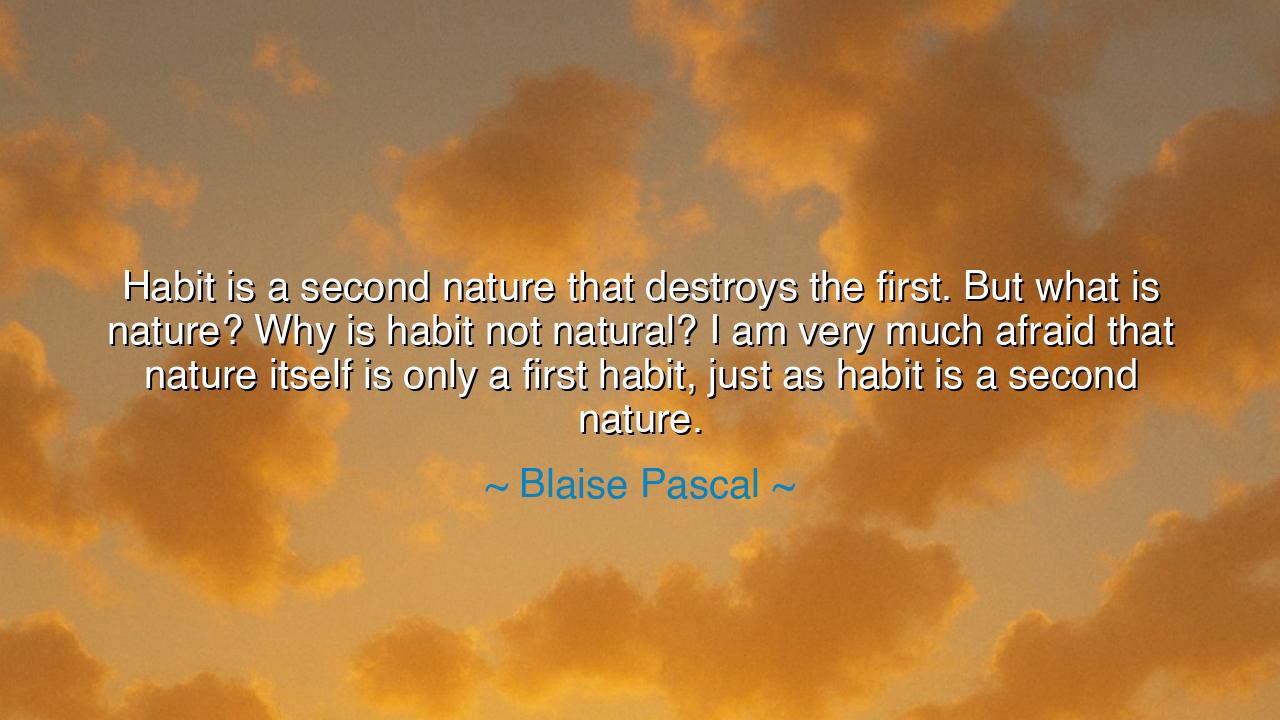
Habit is a second nature that destroys the first. But what is
Habit is a second nature that destroys the first. But what is nature? Why is habit not natural? I am very much afraid that nature itself is only a first habit, just as habit is a second nature.






Blaise Pascal, with the sharpness of a mind both mathematical and mystical, declared: “Habit is a second nature that destroys the first. But what is nature? Why is habit not natural? I am very much afraid that nature itself is only a first habit, just as habit is a second nature.” In these words, he wrestles with the mystery of habit, nature, and the fragile foundation of human identity. He tells us that what we call “natural” may itself be nothing more than a long-practiced habit, and that every habit has the power to shape or even erase what we once thought unchangeable.
The origin of this reflection arises from Pascal’s struggle with the dualities of existence: reason and faith, body and soul, freedom and conditioning. In his Pensées, he sought to strip away illusions to reveal the essence of the human condition. Here, he ponders whether our so-called nature—the instincts and tendencies we are born with—is truly unshakable, or if it is merely the first layer of habit formed from repetition. If this is so, then life itself becomes a contest of habits, with each new practice capable of molding, distorting, or redeeming the self.
Consider the story of Addiction, an ancient scourge that illustrates Pascal’s warning. A man may be born gentle, loving, and free, yet through repeated indulgence in drink or vice, he forges a new self. This second self—the self of habit—consumes the first, until what was once “natural” is forgotten. History recalls the Roman emperor Commodus, who inherited a noble lineage and the order of Marcus Aurelius, but through habits of cruelty, luxury, and bloodlust, destroyed both his nature and his empire. His life became proof that habit can devour nature.
And yet, habit is not only destructive. The sages knew that habit is also the path to virtue. Aristotle himself declared that we become just by doing just acts, brave by doing brave acts, temperate by doing temperate acts. What begins as effort becomes routine, and what is routine hardens into character. Thus, if habit can destroy the first nature, it can also elevate it, creating a higher nature built from conscious choice rather than blind instinct. This is the paradox Pascal places before us: habit is both prison and liberation, curse and blessing.
Pascal’s haunting doubt—“what is nature?”—reminds us that even the things we take as unchanging may be woven from repetitions forgotten. The language we speak, the gestures we call “normal,” the instincts we assume eternal—all of these are shaped by the countless habits of our ancestors. Perhaps, then, our nature is not fixed but fluid, shifting across generations, remade by the weight of repeated action. To recognize this is to awaken to the terrifying power of what we choose to repeat.
The lesson for future generations is clear: guard your habits as you would guard your very life, for they are the silent architects of your destiny. A single act repeated becomes a pathway, and the pathway becomes a prison or a palace. Do not tell yourself that you can indulge “just once,” for once becomes twice, and twice becomes forever. Likewise, do not despise small acts of goodness, for repeated daily they become the foundation of a noble soul.
Practically, this means to cultivate habits of virtue deliberately. Rise early, speak truth, give thanks, restrain anger, practice compassion—not once, but again and again, until these become your new “nature.” Break from those patterns that enslave you, for every habit undone is a thread of fate untangled. Remember always Pascal’s fearful insight: if nature itself is but a habit, then you are not chained to what you were—you are sculpted daily by what you do.
Thus, let this teaching resound as a warning and a hope. Habit is the silent power that shapes worlds and souls alike. It can corrupt kings, destroy empires, enslave the weak—or it can exalt the humble, strengthen the weary, and sanctify the ordinary into the divine. Carry this wisdom, O listener, and let every act you repeat be chosen with care, for in your habits lies the very making of your nature.






AAdministratorAdministrator
Welcome, honored guests. Please leave a comment, we will respond soon